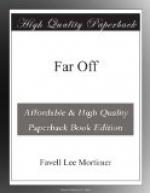A king of a small country called Laos, was taken captive by the Siamese. This king, with his family, were shut up in a large iron cage, and exhibited as a sight. There he was, surrounded by his sons and grandsons, and all of them were heavily laden with chains on their necks and legs. Two of them were little boys, and they played and laughed in their cage!—so thoughtless are children! But the elder sons looked very miserable; they hung down their heads, and fixed their eyes on the ground; and well they might; for within their sight were various horrible instruments of torture;—spears with which to pierce them;—an iron boiler, in which to heat oil to scald them;—a gallows on which to hang their bodies, and—a pestle and mortar in which to pound the children to powder. You see how Satan fills the heart of the heathen with his own cruel devices. The people who came to see this miserable family, rejoiced at the sight of their misery: but they lost the delight they expected in tormenting the old king, for he died of a broken heart; and all they could do then, was to insult his body; they beheaded it, and then hung it upon a gibbet, where every one might see it, and the beasts and birds devour it.
What became of his unhappy family is not known.
But though so barbarous to their enemies, the Siamese in some respects are better than most other heathen nations, for they treat their relations more kindly. They do not kill their infants, nor shut up their wives, nor cast out their parents. Yet they show their cruelty in this:—they often sell one another for slaves. They also purchase slaves in great numbers; and there are wild men in the mountains who watch Burmans and Karens to sell them to the great chiefs of Siam. It is the pride of their chiefs to have thousands of slaves crawling around them.
BANKOK.
This city is built on an island in a broad river, and part of it on the banks of the river. It ought therefore to be a pleasant city, but it is not, owing to its extreme untidiness. The streets are full of mud, and overgrown with bushes, amongst which all the refuse is thrown; there are also many ditches with planks thrown across. There is only one pleasant part of the town, and that is, where the Wats are built. The Wats are the idol-houses. Near them are shady walks and fragrant flowers, and elegant dwellings for the priests. The people think they get great merit by making Wats, and therefore they take so much trouble: for the Siamese are very idle. So idle are they that there would be very little trade in Bankok, if it were not for the Chinese, who come over here in crowds, and make sugar, and buy and sell, and get money to take back to China. You may tell in a moment a Chinaman’s garden from a Siamese garden; one is so neat and full of flowers;—the other is overgrown with weeds and strewn with litter.
The most curious sight in Bankok, is the row of floating houses. These houses are placed upon posts in the river, and do not move about as boats do; yet if you wish to move your house, you can do so; you have only to take up the posts, and float to another place.




